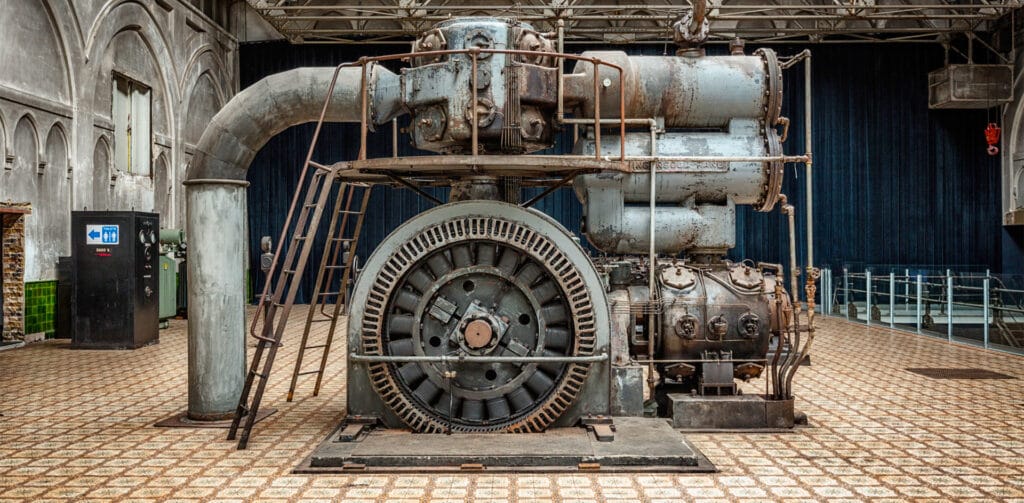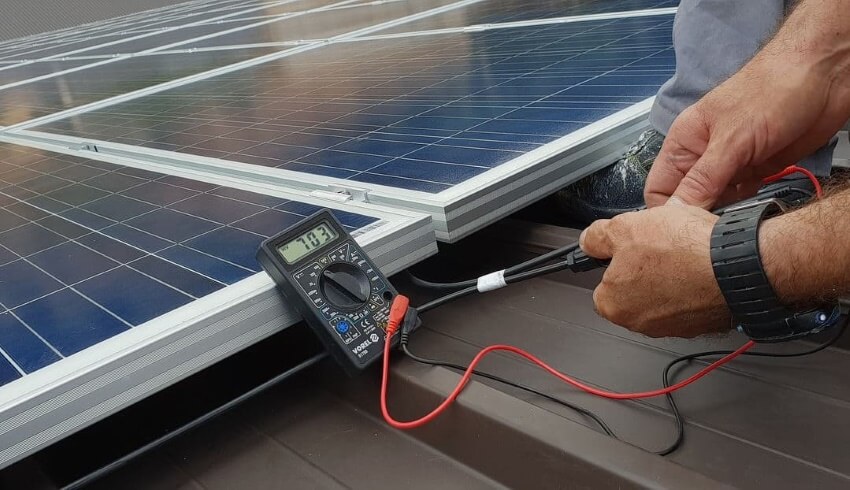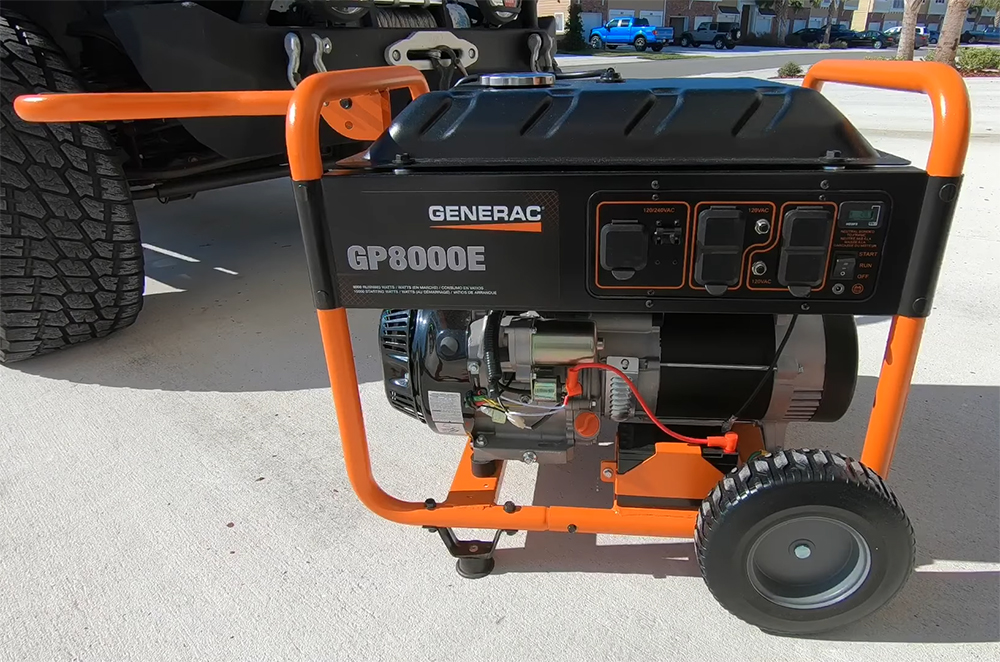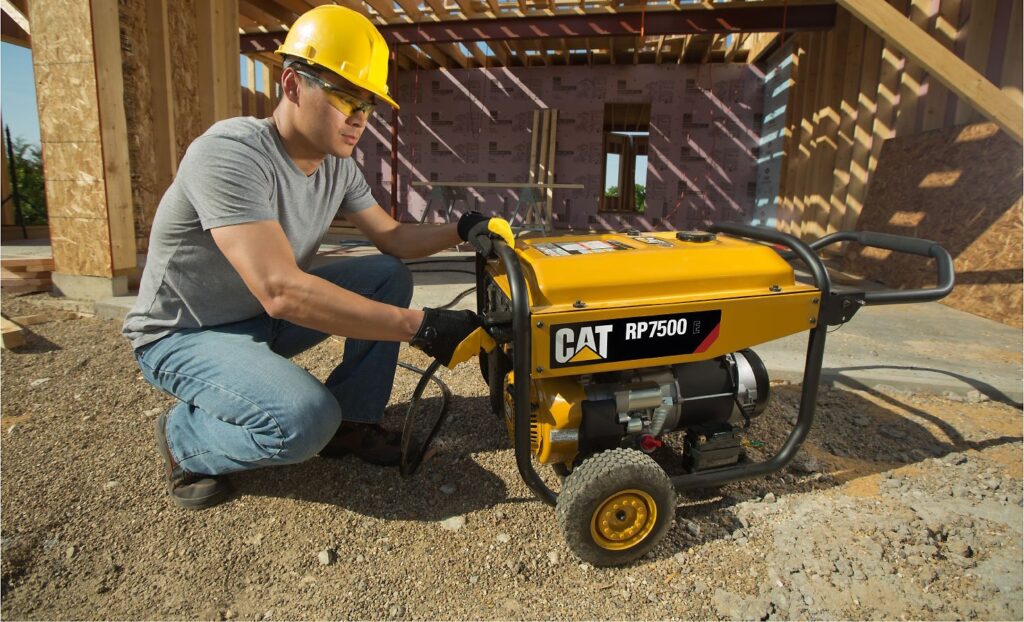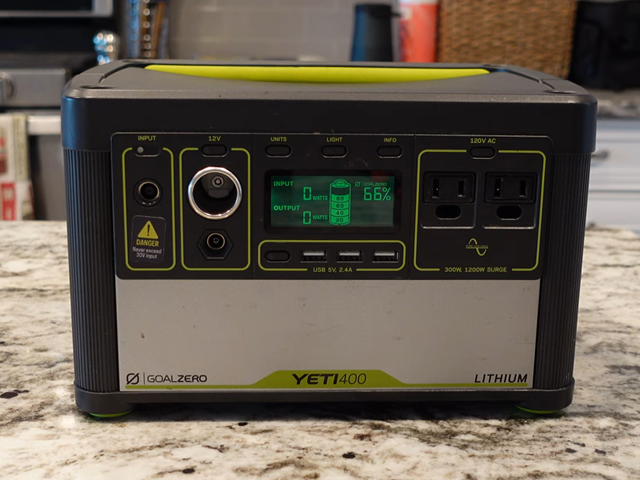
50 amp generators are powerful generators used for large recreational vehicles and campers. These campers are vehicles with four prongs which include two 120V hot wires, one neutral wire, as well as a ground wire. So, what size generator for 50 amp RV is the most ideal for these types of campers?
Well, RV generators are typically available in 3400, 4500, 5500, 6500, 7500, 8500, and 10,000-watt sizes. However, while the minimum of 4,000 watts generator is often recommended, there is no one-size-fits-all solution to selecting a generator for these vehicles. You have to consider your needs. This includes the type and number of appliances you’ll need to run. There are a few steps that can be taken to determine the size required to accommodate a 50 amp RV. Aside from your electrical needs, these include the generator’s wattage, the fuel type, portability, parallel capability, and noise level.
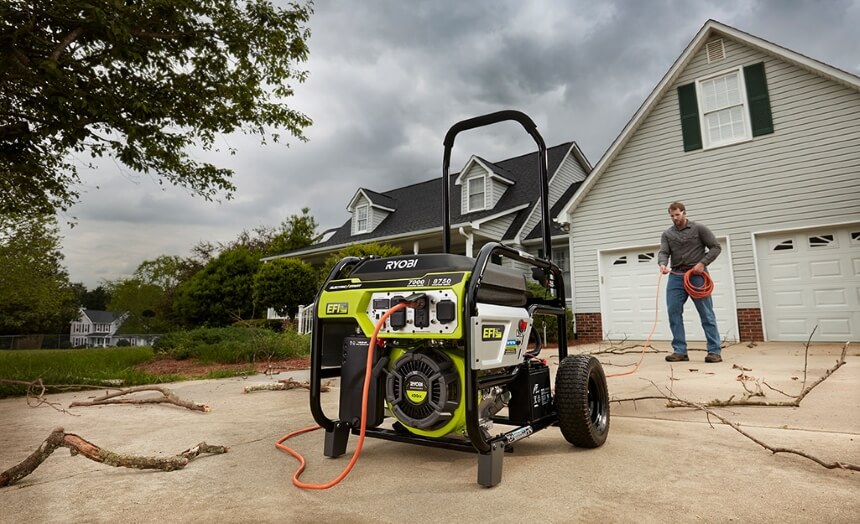
When you want to run an appliance with a generator, the motor must reach normal operating temperature before starting the appliance that carries the electrical load. All appliances equipped with an electric motor can consume 2-3 times more during the first seconds of operation. This is especially true for air conditioners that must prime the refrigerant circuit through the compressor at high pressure.
When the air conditioner is operating, the compressor brings the refrigerant up to operating pressure. When the air is turned off, either by the thermostat or by manual disconnection, the compressor is turned off. The compressor requires 3-4 minutes to wait to allow the pressure in the refrigerant circuit to stabilize before operating again.
If the air conditioning is switched on and off without allowing the pressure to stabilize, the normal thing is that the circuit breaker that protects it trips, the generator is disconnected due to over-consumption, and the protection system against thermal overloads of the air is activated. The overload protection system will reactivate after a few minutes, when the compressor cools down, by itself. Meanwhile, the air conditioner cannot be turned on. If your generator shuts down due to overconsumption, check the location of the temperature sensor on your air conditioners. It is likely located in a place where it receives the airflow from the equipment directly.
If you try to run too much electrical equipment, you can overload your generator. In these cases, it is possible that the generator protection system trips. If this happens, your RV will run out of power for large loads, which will be disconnected instantly. Typically, your inverter will start up and the equipment connected to the inverter’s electrical sub-panel will continue to operate.
With regular generators in a motorhome, the failure of the overload protection system implies that you will have to access the generator itself, which will have the protection circuit breaker in its main panel. Before starting the generator again, disconnect any equipment that may be overloading it.
It is also possible that what pops up is a circuit breaker from the main electrical panel and that the generator continues to operate. If this is the case, first disconnect the equipment that has tripped the circuit breaker in question before lifting it. Otherwise, you will be generating occasional overloads on your generator every time, which in the long run can cause very expensive failures in the electrical part of the generator.
A 50 amp service on a camper or RV can provide up to 12,000 watts. So, it depends on your needs. If you have a 50-amp electrical system in your motorhome, you can basically choose at least a 4,000 to 6,000 watts generator while not exceeding the capacity of the electrical system. 50 amps x 120 volts = 6000 watts. This is why manufacturers of motorhomes with 50-amp electrical systems equip them with 4,000-watt generators. RVs with 50 amp electrical systems are equipped with larger generators. But you can also find very powerful generators with 10,000 running and peak wattage capacity.
You have to note that generators, like all internal combustion engines, lose power when used in very high ambient temperatures or high altitude areas. Therefore, in these circumstances, the nominal power of the equipment will not be available, which may be unable to operate all the electrical appliances.
The power in a generator, according to Cummins, drops by 3.5% for every 300 meters of extra altitude that accumulates in the first 150 meters of altitude above sea level. Therefore, if the generator is used in a town located at 1000 meters above sea level, the generator will have lost almost 10% of the power. ((1000-150) / 300) x 3.5 which for an 8000-watt generator is 800 watts less power.
Power decreases less with temperature, but basically 1% is lost for every 5.5ºC of temperature that is reached above 30ºC. So for example, in southern Europe during the summer, with a temperature of 40ºC, the previous 8000-watt generator will have lost 160 watts of power. Therefore, depending on the location of using the RV, you have to put this into consideration while choosing the generator wattage.
Like every other type of generators, RV generators can be powered by four types of fuel, namely: gasoline, propane, diesel, or natural gas. But what are the advantages and disadvantages of each and which should you prefer?
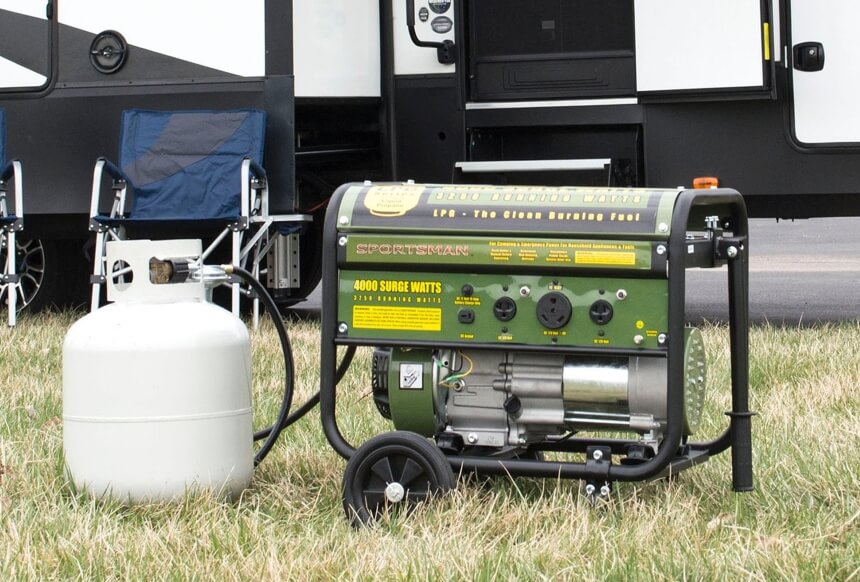
Propane has an average cost per gallon of $2.004, as of January 2021 and a 6kW propane generator burns 1.42 gallons of propane per hour on average. Therefore, running the propane-fueled generator for an hour costs on average $2.7. And for 24 hours, it costs roughly $64.7. However, most propane-powered generators produce the lowest emissions, in terms of noise and carbon. Hence, they are more CARB-compliant and can be used in California, such as the Westinghouse WGen9500.
Gasoline-powered generators are more fuel-efficient than propane models. However, they are less fuel-efficient than their diesel counterparts. But gasoline is much easier to find. Gasoline generators produce lower emissions than diesel. Besides, gasoline generators are suitable for residential use. So, when you’re off the RV, they can be used for backup at home.
On average, gasoline costs $2.25 Trusted Source US gas prices end the year near a pandemic-era high - CNN This is normally the time of the year that gas prices fall to their low point. Not this year. www.cnn.com , according to CNN. A 5,000-watt gasoline generator burns roughly 0.75 gallons of fuel per hour. Therefore, running a gasoline-fueled generator for an hour costs roughly $1.7. And for 24 hours, it costs roughly $40.5. That’s lesser than what propane consumes, but it’s not as fuel-efficient as diesel generators.
Diesel generators are by far the most fuel-efficient type of generator, even though their fuel is one of the most expensive. However, they burn less fuel per hour.
As of January 2021, diesel has an average cost per gallon of $2.7, according to the EIA. An 8,000-watt diesel RV generator burns 0.5 gallons of fuel per hour on average. Therefore, running a diesel-fueled generator for 24 hours costs roughly $32.4. While they’re fuel-efficient, are they suitable for RVs?
Well, diesel generators produce far more fumes than propane and gasoline ones and they are noisier. That’s not all, their fuel is not very accessible, depending on the region and area.
Generator manufacturers, in recent years, have started releasing generator types that can run on either propane or gasoline. This solves the problem of fuel accessibility in remote areas. If you can’t get gasoline, propane will be just fine.
Parallel capability is an essential criterion to consider while choosing an RV generator. This feature helps synchronize two generators of the same brand, model, or type together so they can work in tandem, producing the summation of their wattage capacity. Take for example an instance where you have a small number of appliances on your RV and then you choose a 4000-watt generator. So what happens when you add a clothes dryer, install one or two ACs, and would like to cool drinks with a refrigerator? The 4000-watt generator of course can’t power all the appliances simultaneously. But if it can be paralleled, you can simply get another generator of the same model or from the same brand, synchronize them and double the power.
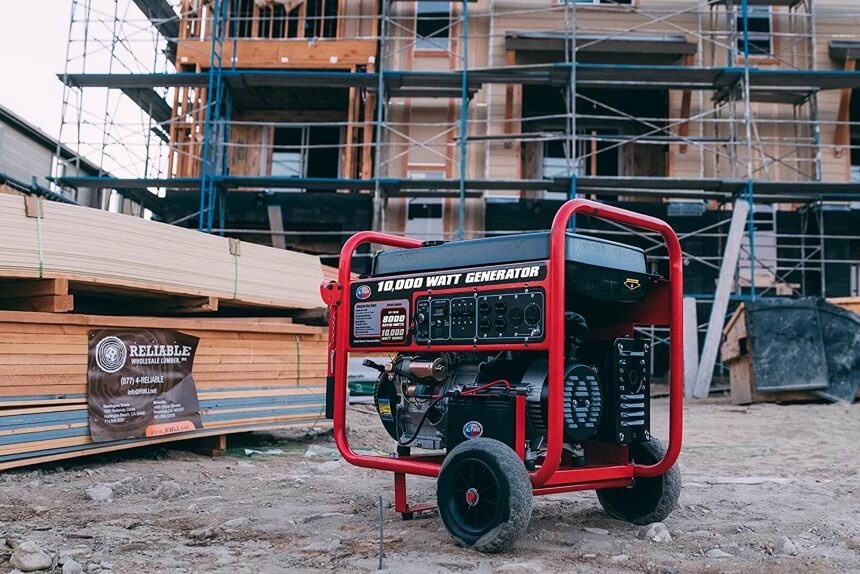
Despite everything, a generator for a 50 amp RV makes a noise of about 70 decibels on average. For example, the Durostar DS10000E produces 72 decibels on average. But many models produce more. The Pulsar G10KBN and the Gentron Power Equipment GG10020GU produce 77 and 76 decibels for example.
However, the permissible noise level is usually 45 dB and 55 dB during daytime and nighttime respectively. To get an idea, 60 decibels is the noise made by people chatting at a normal voice volume. In any room on a flat on the outskirts of any big city, a noise intensity of around 45 decibels is recorded.
That is to say, the isolated generators conveniently for use in an RV, do not make as much noise as it seems. But in a campsite at 10:00 at night, where almost all residents closeby are peacefully sleeping, the noise can be thunderous.
The main problem is that you, inside the motorhome, will not perceive much more than a fairly muffled background noise. But outside, 70 dB can be deafening, especially when you’re closer within 20 feet of range, which, will be rising towards 100 dB at this distance. The advice is to choose a generator that is as quiet as possible, although this quality is rare in these types of generators.
Our recommendation is to add acoustic insulation to RV generators that travel around or camp in non-remote areas. In the fight for noise reduction, insulating panels should be added to both sides of the generator.
Finally, motorhomes do not usually have a floor in the generator compartment. The recommendation is to create a cover for the base of the compartment made with a 5mm thick PVC sheet. To this, you can add a couple of layers of fiberglass impregnated with polyester resin to gain mechanical stability and resistance. The plate must be screwed to the chassis of the vehicle and the front fiber, so that it covers the entire front hole, but leaving space for the air inlet of the generator and other possible radiators of the vehicle.
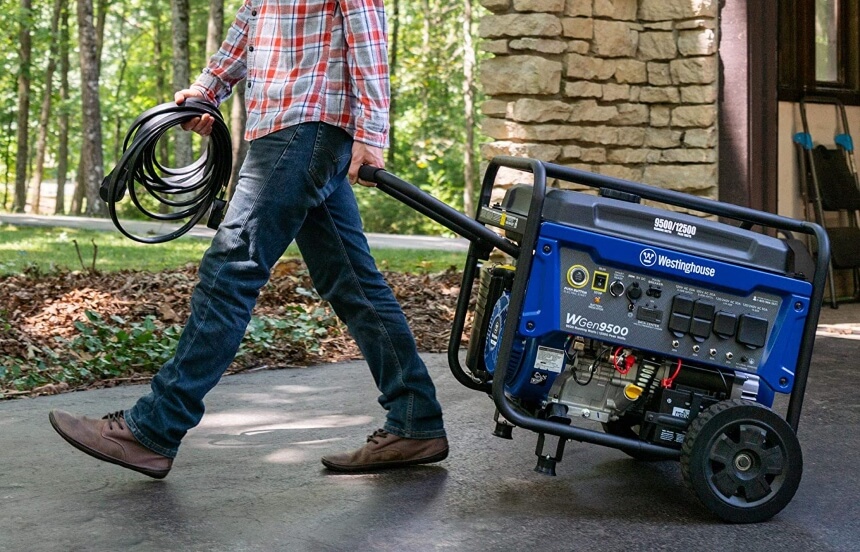
Some RV owners try modifying a lower capacity generator to accelerate faster. They think this will save them money by purchasing a smaller generator and creating extra power through acceleration. This practice does not work, and in fact, it can damage the generator. Also, overloading a generator can cause a variety of problems. In addition to power outages and additional wear and tear on the device, it can even lead to fires.
So you need an appropriate generator designed for 50 amp RVs. And before asking the question of what size generator for 50 amp RV, the RV owner must estimate what appliances and lights he needs to use at the same time, determine their total powers, and use this as a guideline for the power of the selected generator.
